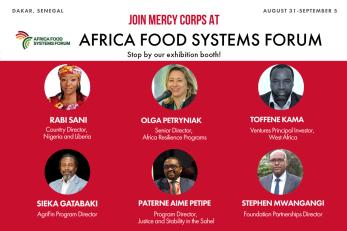Catalyzing inclusive, resilient, and nutritious food systems
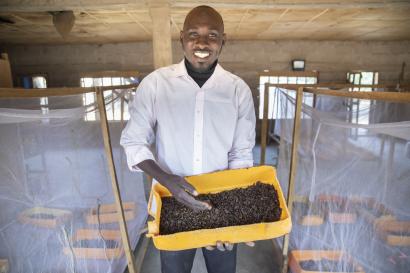
Food Security and Food Systems Strategy highlights how we work to move us closer to a world where people are well-nourished at all times, with access to sustainably produces, safe and nutrition food.
Resilient Livelihoods for Nutrition emphasizes the significance of supporting households in adapting livelihoods to achieve dual nutrition and economic outcomes within food systems in the face of various shocks and stresses.
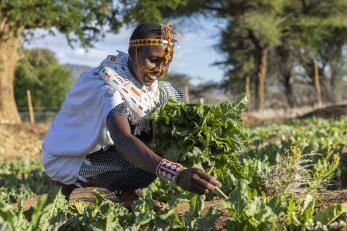
Climate resilient agriculture
We partner with farmers, young innovators, entrepreneurs, and policy-makers to boost soils, water and biodiversity, restore rangelands, reduce food loss and waste, and facilitate access to affordable, nutrient-rich foods for all.
Resources
Building Resilient Farming Systems - Resource center for the Resilience Design in Smallholder Farming Systems (RD) Approach.
Mercy Corps’ Agriculture Systems Approach - Highlights how we strengthen agriculture systems to build sustainable climate resilience with agriculture and livestock producers and their communities.
Climate Resilience in Northeast Nigeria - Shares practical experiences from Northeast Nigeria working with market actors to sustainably embed commercial markets for affordable, climate-adapted seeds.
Assessment of the Hill Approach in DRC - Evaluates an integrated agroecological approach to boost climate resilient agricultural production and enhance social cohesion.
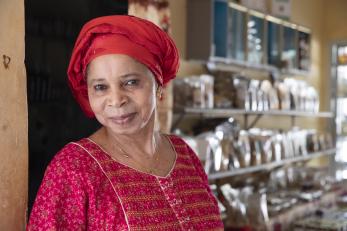
Inclusive value chains
We work with producers, agri-preneurs, financial institutions, corporates, and policy stakeholders to strengthen SME capacity and growth, de-risk agri-food investments while catalyzing access to inclusive finance, and facilitate nutrition-sensitive markets to drive economic growth, climate adaptation, and food security.
Resources
Integrating Livestock Value Chains in Ethiopia - Highlights how Mercy Corps strengthened the livestock value chain in remote Ethiopia to improve revenues.
Poultry sector – opportunities for youth in Liberia - Improvements in the poultry sector of Liberia have unlocked economic opportunities for young people.
A Market System Approach to Sudan Crisis - As the Sudan crises broke out, Mercy Corps leveraged it relationships with local banks to pivot and provide needed humanitarian assistance.
Strengthening Financial Inclusion
Financial Inclusion: Mercy Corps’ Approach - Highlights how we partner, facilitate and offer technical advisory services to ensure people’s access to affordable financial services.
Achieving Financial Inclusion in Northern Nigeria - Three models of supporting financial services in remote Nigeria in support of food system development.
Financial Services in the Lowlands of Ethiopia: The Impact of Multi-Phase Investments highlights how fifteen years of multi-stage investments transformed financial services in the lowlands of Ethiopia, introducing mobile money, shaping sharia-compliant microfinance offerings to first mile entrepreneurs, and enabling digital credit services.
Through the Gender Lens – State of the Financial Sector in Uganda - a review of the financial sector in Uganda and the barriers to overcome to ensure women’s participation.
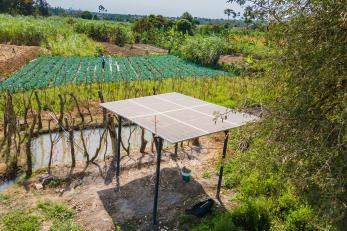
Green energy access
We work with the private sector, government actors and communities to enhance access to, and innovative financing solutions for, clean energy products and services which increase agricultural productivity, facilitate processing, cold chain and distribution, reduce food loss and waster, and enhance value addition.
Resources
The Power of Renewable Energy: A review of how improving access to renewable energy strengthens climate resilience.
Powering the Uptake of Climate Change Mitigating Pumps: Learning Brief on market-based approaches to solar irrigation among small holder farmers in Uganda.
Powering Change: Connecting women entrepreneurs to renewable energy: A success story of how renewable energy catalyzes production, processing and sale of diverse foods, while boosting incomes.
Mercy Corps’ Energy Access Approach: A global overview of our approach to improving access to Energy.
Energy for Impact: An overview of Mercy Corps’ Energy for Impact (E4i) initiative, which works to strengthen the enabling environment for energy access across Africa.
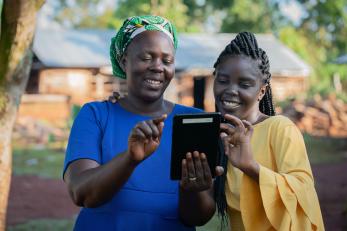
Smart digital technology
Mercy Corps AgriFin works with public and private sector partners to design, test and scale inclusive, digitally enabled products and services for small scale producers in order to increase their productivity, incomes and resilience. Through its flagship program, AgriFin, Mercy Corps helps its partners to de-risk innovation, support inclusive service delivery and business models, providing needed insights to boost agricultural innovation and investments in underserved markets.
Resources
Mercy Corps Agrifin website details program activities and impact. Since its inception in 2012, Agrifin has partnered with farmer-facing organizations (FFOs) to harness the promise of digital technology to expand critical services to smallholder farmers across Africa and advance a future where every farmer prospers in a digitally connected economy.
AgBase is a program and business intelligence platform by Briter and Mercy Corps AgriFin that strengthens data across agri-food and agri-tech sectors. It combines insights and research on investment to support better decisions for building sustainable, inclusive Agri-Food systems.
Sprout is an open content platform built on collaboration with Farmer-Facing Organizations (FFOs) to provide tailored, expert content and real-time services that address the specific challenges of small-scale farmers. By bridging critical knowledge gaps, Sprout empowers FFOs to better support farmers with the tools and information they need for effective farming, market access, livestock management, and adapting to climate change.
The AgriFin Learning Event (ALE) website is an annual event driving, hosted by Mercy Corps AgriFin, driving conversations and connections on innovative, sustainable agri-food systems across Sub-Saharan Africa, the Global South, and Asia. It brings together key players in the agri-fintech ecosystem, including DFS enablers, investors, policymakers, donors, and small-scale producers. This year’s 9th ALE, in partnership with Briter, focuses on “Data-Driven Trends and Innovations in Africa: Harnessing Intelligence and Innovation to Build Sustainable, Investable Agri-Food Systems.”
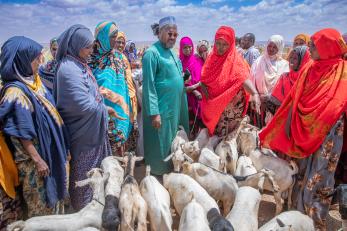
Livestock systems and pastoralism
We work across Africa’s drylands to expand market access to feed, fodder and animal health services, facilitate trade, and boost rangeland health to fuel the pastoral economy and build climate resilience.
Resources
Justice and Stability in the Sahel (JASS) is a Program funded by the Foreign, Commonwealth and Development Office (FCDO) aiming to improve equitable and inclusive outcomes in land, natural resource governance, and justice for Malians and Nigeriens across herding and farming communities.
Transforming Livelihoods in the Horn of Africa’s Livestock Corridors highlights Mercy Corps’, 12-year Regional Livestock Program bolstering trade, markets, ecosystems and livelihoods across East Africa's transnational livestock corridors.
Transforming last-mile animal health services to build resilience in Ethiopia discusses market-based approaches to catalyzing affordable, quality animal healthy services across the drylands.
Realizing resilience: Effects of integrated programing on households’ sources of resilience and food security amidst droughts demonstrates how market-based programming can boost diverse range of services and inputs critical to sustaining pastoral and agro-pasotral food systems through drought.
How Livestock Can Advance Climate Adaptation and Mitigation Goals in Africa’s Drylands discusses the critical role of pastoral food systems in driving climate adaptation and mitigation, while supporting livelihoods and food security.
One who learns will eventually teach shares the story of Muna Ismali, who diversified her businesses in the pastoral system through de-risking and catalytic programming.
Research from our work on the FCDO-funded Strengthening Pastoralism and Agriculture in Recurrent and Protracted Crises (SPARC)
Innovations for pastoralists and agro-pastoralists in fragile and conflict-affected settings - This scoping paper presents key findings from the SPARC review of the innovation landscape specific to the contexts of fragile and conflict-affected settings.
The use of gender transformative approaches (GTAs) in pastoralist societies: What we know about what works and recommendations for a way forward - Agro-pastoral communities in drylands face worsening climate, economic and social pressures, all of which disproportionately impact women. GTAs can help build resilient, sustainable livelihoods.
Supporting adolescent girls’ well-being in climate- and conflict-affected areas of East and West Africa - This policy brief synthesizes evidence on interventions to support the financial and psychosocial wellbeing of adolescent girls in vulnerable pastoral areas, highlighting gaps to inform future programmes and policies.
Forecasts for pastoralists: increasing demand for weather forecasts to support adaptation in northern Kenya - Advances in forecasting, observation networks and collaboration mean better weather forecasts, so why do pastoralists show little demand for them, and how can we better reach them?
Join Us and Our Partners in AFSF Events:
From Humanitarian Aid to Thriving Economies: Driving Inclusive and Resilient Food Systems in Fragile Contexts – 1st Sept, 2:30pm–4:00pm
Empowering Smallholder Farmers through Access to Sustainable Inputs: Seeds, Bio-Solutions and Mechanization – 2nd Sept, 8:30am–10:00 am
Scaling Inclusive Finance for Youth-led Agribusinesses – 3rd Sept, 6:00pm–7:30pm
Unlocking Africa's Red Meat Opportunity in East Africa – 3rd Sept, 12:00pm–1:00pm
Herding Change: Livestock Allies Meet and Greet – 3rd Sept, 4:30–6:30pm Baobab Restaurant, CICAD
From Margins to Mainstream: Recognizing the Role of Pastoralism in Food Systems Transformation – 4th Sept, 8:30am–10:00am
Biodiversity, Climate and Land: Making the Conventions Work for Africa – 4th Sept. 10:30am–12:00pm
Contact us
Olga Petryniak, Senior Director, Africa Resilience Programs, opetryniak@mercycorps.org, What’s app: +1 202 957 5142 and +254 719 239 794
Sieka Gatabaki, Agrifin Program Director, sgatabaki@mecycorps.org, What’s app: +254 726 290477
Toffene Kama, Ventures Principal Investor, West and Central Africa, tkama@mercycorps.org +221 77 287 2752
Paterne Aime Petipe, Justice and Stability in the Sahel, Program Director, papetipe@mercycorps.org, What’s app +223 831 17034
Rabi Sani, Country Director, Nigeria and Liberia, rasani@mercycorps.org, +234 803 339 7545
Stephen Mwangangi, Director of Foundation Partnerships, smwangangi@mercycorps.org, +254 724 946 980
